| Article ID | Journal | Published Year | Pages | File Type |
|---|---|---|---|---|
| 3281712 | Clinical Gastroenterology and Hepatology | 2013 | 10 Pages |
Abstract
Primary sclerosing cholangitis (PSC) is a chronic immune-mediated disease of the liver of unclear etiology, characterized by chronic inflammation and fibrosis of bile ducts. It primarily affects middle-aged men and is associated with 4-fold increased mortality as compared with an age- and sex-matched population. Progressive biliary and hepatic damage results in portal hypertension and hepatic failure in a significant majority of patients over a 10- to 15-year period from the initial diagnosis. In addition, PSC confers a markedly increased risk of hepatobiliary cancer, including cholangiocarcinoma and gallbladder cancer, as compared with the general population, and cancer is the leading cause of mortality in patients with PSC. It is associated with inflammatory bowel disease in 70% of patients and increases the risk of colorectal cancer almost 10-fold. Despite significant research efforts in this field, the pathogenic mechanisms of PSC are still incompletely understood, although growing evidence supports the role of genetic and immunologic factors. There are no proven medical therapies that alter the natural course of the disease. Thus, liver transplantation is the only available treatment for patients with advanced PSC, with excellent outcomes in this population.
Keywords
Primary sclerosing cholangitis (PSC)UDCACA19-9AIHMRCPCCAPSCIBDEndoscopic retrograde cholangiopancreatographycarbohydrate antigen 19-9Ursodeoxycholic acidInflammatory bowel diseasemagnetic resonance cholangiopancreatographyColorectal cancerfluorescence in situ hybridizationFishAutoimmune hepatitisLiver transplantationCRCPrimary sclerosing cholangitisCholangiocarcinomaERCP یا endoscopic retrograde cholangiopancreatography Ulcerative colitis
Related Topics
Health Sciences
Medicine and Dentistry
Gastroenterology
Authors
Siddharth Singh, Jayant A. Talwalkar,
